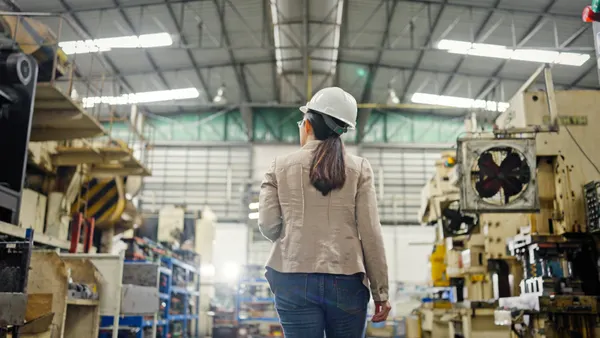Dive Brief:
- Amid high turnover, skills shortages and changing employee preferences, manufacturers who expect to expand their frontline workforce over the next year — and 62% say they do — will need to aggressively ramp up their efforts to attract, train and retain skilled labor, according to a 3Q survey by PwC and the Manufacturing Institute, an affiliate of the National Association of Manufacturers.
- For example, 86% of the 108 HR and operations leaders surveyed said safety was an important factor in creating a positive workplace for frontline workers – hourly, skilled employees who play a direct role in production, PwC noted. Organizations can differentiate themselves from competitors and improve frontline workers’ experiences by looking beyond physical safety to viewing their well-being holistically, such as by providing frequent breaks, mental health resources, on-site fitness centers and flexible work arrangements, PwC suggested.
- To ensure their initiatives further positive, meaningful experiences for frontline workers and are connected to business outcomes, PwC recommends manufacturers regularly conduct surveys to track their workers’ needs and preferences; install a dedicated leader to continually monitor and help workers’ experiences; work more closely with front-line managers to facilitate improvements; introduce initiatives that offer scheduling flexibility; and redouble efforts surrounding mentoring.
Dive Insight:
Regardless of the industry, the takeaway should be familiar to HR professionals: While manufacturers face a “rising urgency to help improve the frontline worker experience,” the concern exists in many business sectors and about a range of job roles, according to recent studies.
For instance, an October report from Aflac found that more than half of U.S. workers say they’re experiencing burnout, and nearly the same number lack confidence their employer cares about them and their well-being.
The PwC report didn’t specifically indicate why turnover is high among frontline production workers, but the findings raise red flags: More than one-third of manufacturers have experienced front-line employee attrition rates exceeding 10% over the last six months.
The news is still encouraging. Manufacturers said they’re willing to try a host of different initiatives to improve the employee experience — the “sum of all interactions, sentiments and perceptions that employees have with their employer and leaders” — for frontline workers. Flexibility and scheduling is an example, the survey found. After safety, it’s one of the most important factors for creating a positive workplace and boosting frontline workers’ experience.
Although in some circumstances, product and shift needs may constrain scheduling flexibility, half of manufacturers say they are able to offer frontline workers dynamic scheduling, such as compressed workweeks, shift bidding/swapping and adjusted shift time. Of those who do provide dynamic scheduling, more than three-quarters allow frontline workers to work fewer days per week, but more hours each day. Over half of manufacturers allow workers to take personal time on short notice.
These initiatives are consistent with recent findings by Indeed’s Hiring Lab that job postings advertising a 4-day workweek have grown since 2019, but more so among in-person sectors than remote-friendly industries. Indeed also found that postings in manufacturing and production advertising a 4-day workweek increased by 40% over the past four years — an issue labor unions have demanded be part of their contract negotiations.
A majority of HR and operations leaders who responded to the PwC survey also recognize the importance of investing in onboarding — typically 5 to 10 days — for setting frontline workers up to succeed from their first day on and lowering worker attrition rates during their first 90 days on the job.












